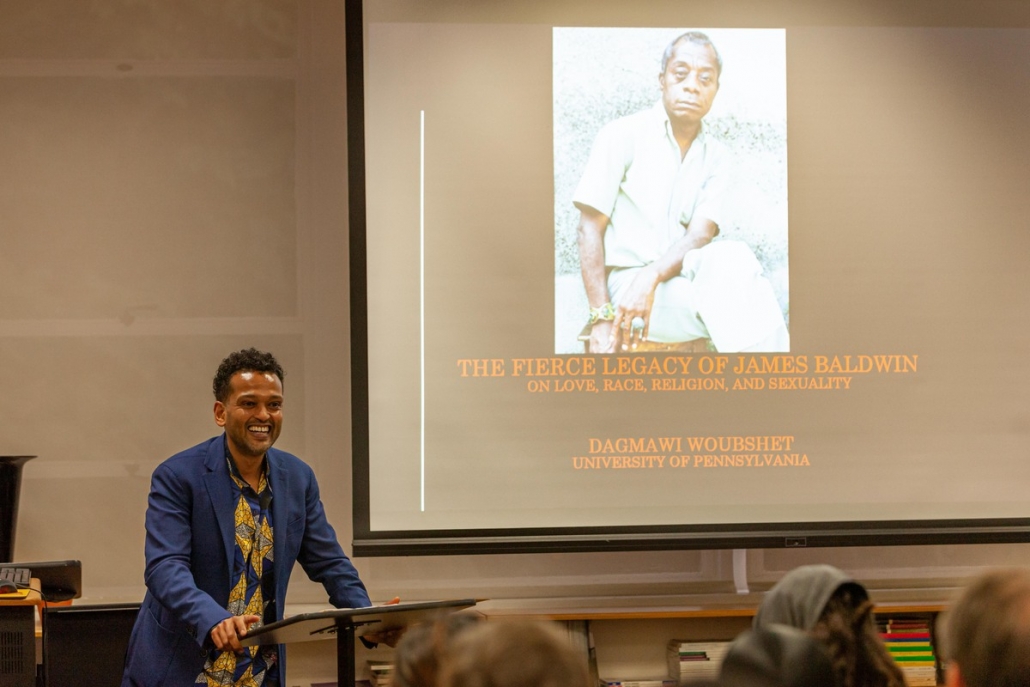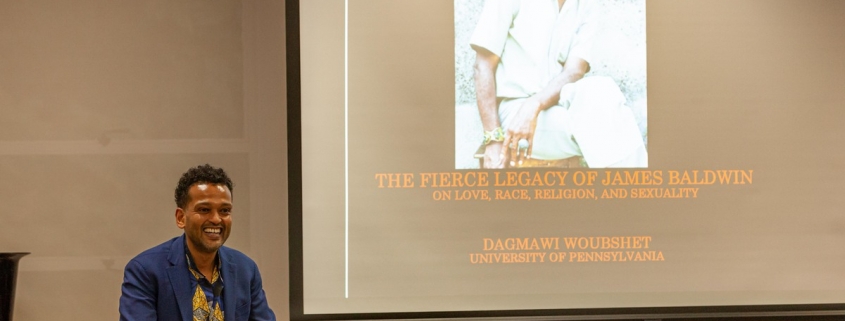English department marks James Baldwin’s legacy

The work of novelist and playwright James Baldwin is having yet another resurgence. Dagmawi Woubshet, the Ahuja Family presidential associate professor of English at the University of Pennsylvania, discussed the revival of Baldwin in the current generation along with several other aspects of the literary icon’s life, writing and image on Monday.
The event, titled “The Fierce Legacy of James Baldwin: On Love, Race, Religion, and Sexuality,” was sponsored by USC’s English department and populated with scholars and students alike.
The presentation touched on Woubshet’s upcoming book “Here Be Saints: James Baldwin’s Late-Style.” While he conceded that sects of the population had kept Baldwin’s work alive since his death, most notably other Black queer authors, Woubshet contends that the level of recognition he has received in recent years makes this resurgence particularly noteworthy. Among this recognition he cited recent acknowledgments of Baldwin’s work: former President Barack Obama’s use of a Baldwin quote during the opening of the National Museum of African American History and Culture, the founding of the “James Baldwin Review,” an annual journal in Baldwin’s honor, the documentary “I Am Not Your Negro” developed from a letter written by Baldwin and the film “If Beale Street Could Talk.”
Woubshet called Baldwin a “rare artist” and “preeminent public [intellectual],” showcasing quotes from the author that he found most indicative of his influence. With each quote projected across the screen behind him, he commented on the prevalence of Baldwin’s words among younger populations. Many quotes he included in his presentation were very popular on social media, particularly Twitter.
The bulk of the presentation concerned the differences between Baldwin’s early works and those published later in his life — specifically the collection of essays “The Fire Next Time” and the essay “To Crush the Serpent,” which Woubshet considered a late sequel to the collection.
What was of primary interest to Woubshet were the differing ways in which Baldwin looked back on his experience as a young evangelical preacher. One of the primary contrasts was the outright address of Baldwin’s sexuality in “To Crush the Serpent.”
During the Q&A session after the presentation, Woubshet received a question about an earlier acknowledgment Baldwin made of sexuality in a late 1940s essay. Woubshet was sure to distinguish that, while the essay was revolutionary for the time, it lacked the “I” which was a trademark of Baldwin’s personal narrative essays. He called “To Crush the Serpent” an “unflinching characterization of the author’s sexuality.” He said this unflinching characterization was largely unprecedented in his previous work, and it was a part of what compelled him to focus on that essay in his book.
To the question of what makes Baldwin’s work resonate today, Woubshet simply replied “vulnerability.”
“I can find myself in a Baldwin essay,” Woubshet said.
He continued on to discuss how his work licenses readers to question themselves and their own vulnerability, which in turn enables his words to stand the test of time.
Dr. Zakiyyah Jackson, an assistant professor of English at USC who organized the event, cited “the novel invention of literary form” as one of the author’s most striking traits.
“James Baldwin really was someone who took established forms and pushed those established forms to the limit or even ruptured those forms,” Jackson said. “[He’s] just such a brilliant and emblematic writer to think with in terms of what makes African American literary tradition distinctive.”
Jackson explained that the choice in Woubshet as the speaker for the event was a decision influenced by his strides in African American literary study.
“[I believe Professor Woubshet] is a really gorgeous reader,” Jackson said. “And I wanted the students to get a model of the kind of reading practice that I’m trying to teach them and for it to come alive for them from somebody else other than me.”
CORRECTION: An earlier version of this story misspelled James Baldwin’s name. The Daily Trojan regrets the error.

